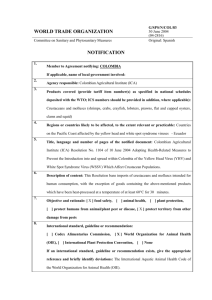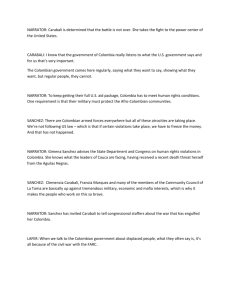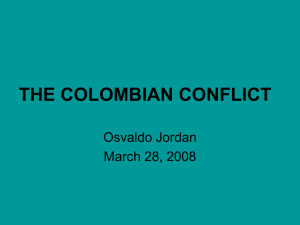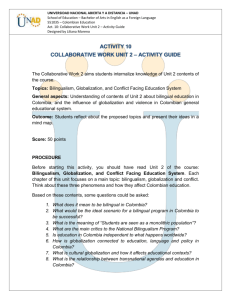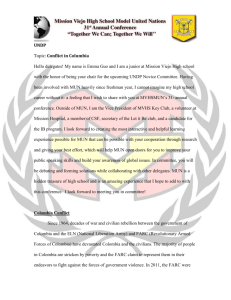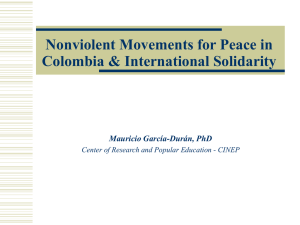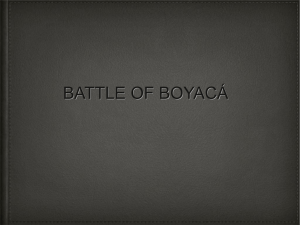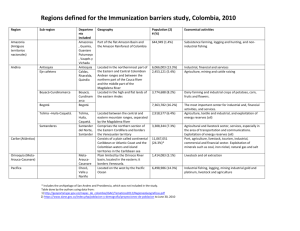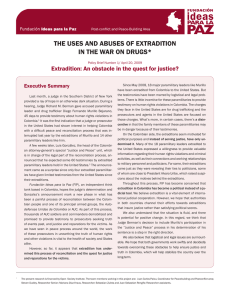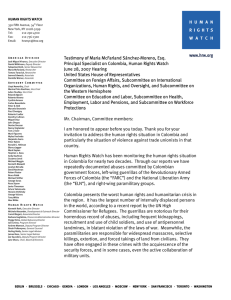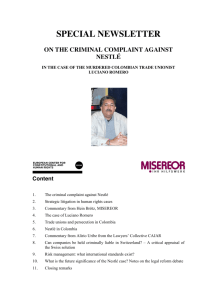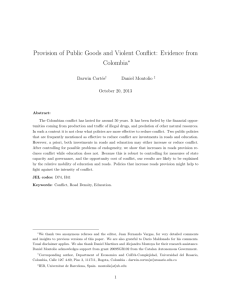Jorge 40 - the US Office on Colombia
advertisement
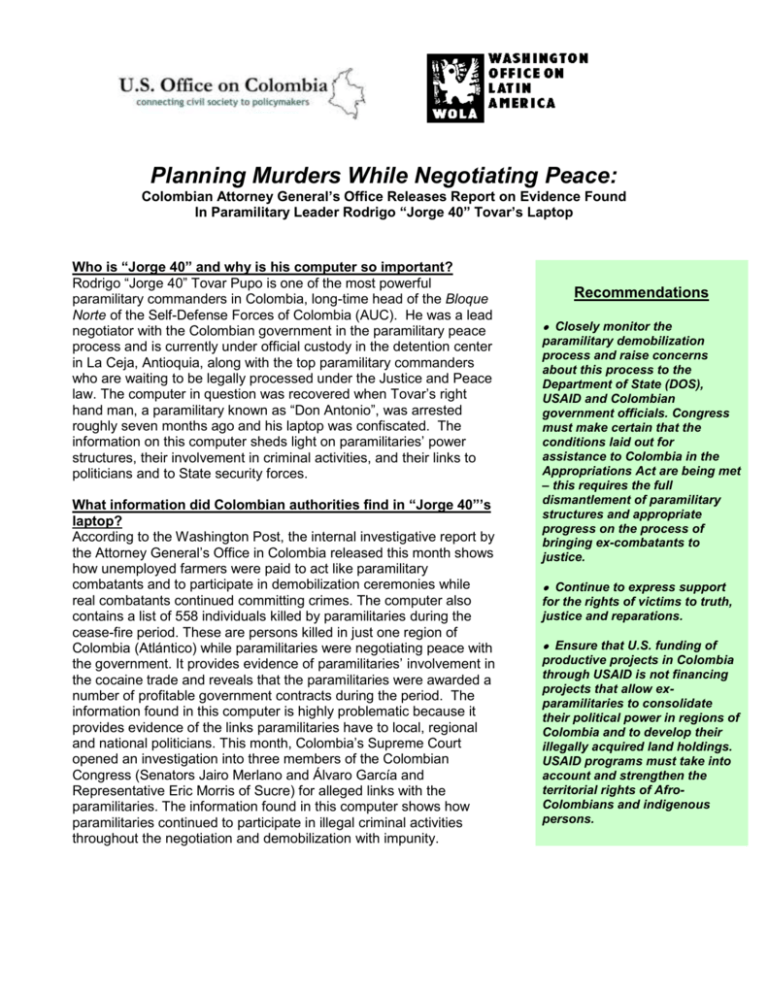
Planning Murders While Negotiating Peace: Colombian Attorney General’s Office Releases Report on Evidence Found In Paramilitary Leader Rodrigo “Jorge 40” Tovar’s Laptop Who is “Jorge 40” and why is his computer so important? Rodrigo “Jorge 40” Tovar Pupo is one of the most powerful paramilitary commanders in Colombia, long-time head of the Bloque Norte of the Self-Defense Forces of Colombia (AUC). He was a lead negotiator with the Colombian government in the paramilitary peace process and is currently under official custody in the detention center in La Ceja, Antioquia, along with the top paramilitary commanders who are waiting to be legally processed under the Justice and Peace law. The computer in question was recovered when Tovar’s right hand man, a paramilitary known as “Don Antonio”, was arrested roughly seven months ago and his laptop was confiscated. The information on this computer sheds light on paramilitaries’ power structures, their involvement in criminal activities, and their links to politicians and to State security forces. What information did Colombian authorities find in “Jorge 40”’s laptop? According to the Washington Post, the internal investigative report by the Attorney General’s Office in Colombia released this month shows how unemployed farmers were paid to act like paramilitary combatants and to participate in demobilization ceremonies while real combatants continued committing crimes. The computer also contains a list of 558 individuals killed by paramilitaries during the cease-fire period. These are persons killed in just one region of Colombia (Atlántico) while paramilitaries were negotiating peace with the government. It provides evidence of paramilitaries’ involvement in the cocaine trade and reveals that the paramilitaries were awarded a number of profitable government contracts during the period. The information found in this computer is highly problematic because it provides evidence of the links paramilitaries have to local, regional and national politicians. This month, Colombia’s Supreme Court opened an investigation into three members of the Colombian Congress (Senators Jairo Merlano and Álvaro García and Representative Eric Morris of Sucre) for alleged links with the paramilitaries. The information found in this computer shows how paramilitaries continued to participate in illegal criminal activities throughout the negotiation and demobilization with impunity. Recommendations Closely monitor the paramilitary demobilization process and raise concerns about this process to the Department of State (DOS), USAID and Colombian government officials. Congress must make certain that the conditions laid out for assistance to Colombia in the Appropriations Act are being met – this requires the full dismantlement of paramilitary structures and appropriate progress on the process of bringing ex-combatants to justice. Continue to express support for the rights of victims to truth, justice and reparations. Ensure that U.S. funding of productive projects in Colombia through USAID is not financing projects that allow exparamilitaries to consolidate their political power in regions of Colombia and to develop their illegally acquired land holdings. USAID programs must take into account and strengthen the territorial rights of AfroColombians and indigenous persons. Will the victims of the violence perpetrated by “Jorge 40”’s men obtain justice? Colombian President Álvaro Uribe recently issued a decree which will allow demobilized paramilitaries to reduce their sentences to less than 5 – 8 years. Paramilitaries will be allowed to discount from their sentences time served in the negotiation center and their working in productive projects. The decree issued was meant to clarify interpretation of the Colombian Constitutional Court decision with regards to the Justice and Peace law. Instead it disregards key aspects of the Court’s ruling. What type of justice have victims’ families received so far? On a recent trip to Colombia, WOLA staff spoke with an internally displaced Kankuamo indigenous leader from the Sierra Nevada (an area controlled by Jorge 40’s men). This IDP leader became forcibly displaced after watching his wife and daughter, raped by paramilitaries. His family still cannot return to their lands because of threats from ‘demobilized’ paramilitaries; meanwhile, the rapist, a mid-level paramilitary who was also wanted for 17 murders, served 2 months in jail and was released. Under the new decree, victims of paramilitary crimes committed should be notified of the legal processes against the accused so they can testify. However, according to the Colombian Commission of Jurists, the public notifications issued by the Attorney General’s Office are not being broadcast nationally via radio and television. In addition, they give only 20 days for witnesses to come forward. There are also no provisions to protect those who testify, making it extremely dangerous to do so. The decree also makes individual reparations virtually impossible – so those who have had land stolen by these groups will have little hope of ever getting it back. It is unclear how the hundreds of thousands of internally displaced persons, that include Afro-Colombian and indigenous persons who according to Colombian laws have rights over their territories, will ever have the opportunity to return to their homes if stolen land is not turned in by the paramilitaries. Current U.S. funding to the Colombian paramilitary demobilization The U.S. Congress has approved funding for the Colombian paramilitary demobilization process for up to $20 million in the Appropriations Act for FY 2006. The largest component of this funding is earmarked for reintegration of ex-combatants. The current productive programs for reinserted paramilitaries proposed by the Colombian government have been widely criticized by victims’ organizations. There is concern that some of these productive projects will be implemented on land appropriated by paramilitary groups. It is important that the effectiveness and impact of this funding is carefully monitored by Members of the U.S. Congress to ensure that U.S. funding does not contribute to the strengthening of criminal networks in Colombia. For more information: October 17, 2006 article by Juan Forero, Washington Post Foreign Service “In Colombia, a Dubious Disarmament” http://www.wola.org/Colombia/article_dubious_disarmament.htm October 13, 2006 article by Hugh Bronstein, Reuters “Colombian warlord incriminated by his own laptop” http://www.wola.org/Colombia/article_Jorge_40_Laptop.htm October 12, 2006 press release by Colombian Commission of Jurists “CCJ asks for changes in the process for notifying of victims of paramilitaries” http://www.wola.org/Colombia/CCJ_release_paramilitary_victims.htm October 4 press release by Colombian Commission of Jurists “In spite of the changes, the Government continues to ignore the Constitutional Court decision in regulating law 975” http://www.wola.org/Colombia/CCJ_release_law_975.htm Contact: Gimena Sánchez-Garzoli, Senior Associate for Colombia and Haiti Washington Office on Latin America 202-797-2171 Heather Hanson, Executive Director U.S. Office on Colombia 202-232-8090
